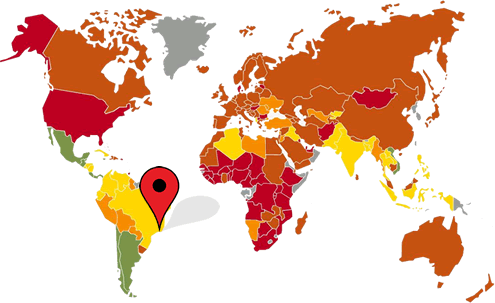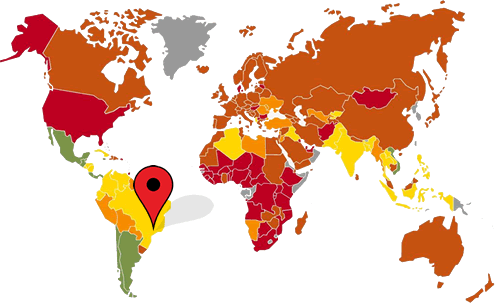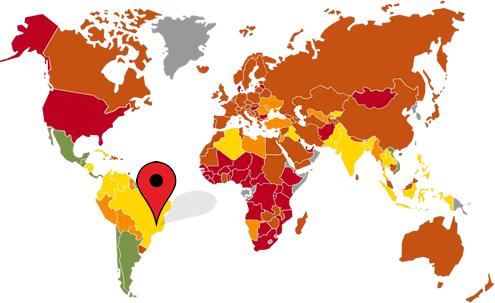Teaching English in Rio de Janeiro, Brazil

Report submitted on 22 October, 2015 by Kirsty Baird.
Teaching English in Rio de Janeiro, Brazil:
How can teachers find teaching jobs in Rio de Janeiro, Brazil?
Native ESL teachers for all levels and ages are highly sought after here in Rio. Word of mouth and recommendations are the best way to get your name out there and private one on one classes are the most demanded. Another method is through language consulting companies that hire native teachers and set up classes for them inside multi national companies. Native ESL teachers can also simply walk into any of the multitude of English courses and apply for jobs that way. The pay through courses and consulting companies is not good, so most natives work privately.
The main English teaching jobs available are:
Full time English language school positions, part time English language school positions, agencies (send teachers to different locations), teaching at kindergartens / pre-schools, teaching at private international schools, teaching at companies, teaching at community centers, etc., private teaching (not through a school, agency, etc.).
What are the minimum teaching requirements?
The demand here is so high that the minimum requirement is speaking native English. Obviously, experience and even a teaching degree count especially when the student is at a more advanced level.
What teaching requirements would you recommend?
I would recommend that you have some kind of previous teaching experience. Knowing how to evaluate the needs of each student and prepare an organized curriculum that will effectively help the student achieve their goals, is very important for your success as a teacher. That doesn’t necessarily come naturally to some native speakers, but could be taught through online courses or teacher preparatory courses.
What are the levels of payment?
I currently charge R$70,00 per hour (US$24 per hour) as a private teacher which is the average rate for a native teacher. If I worked in a course, I would probably earn about half of that.
How many teaching days a week is normal?
5 days per week
How many face-to-face teaching hours a week is normal?
20 hours per week
What is the normal arrangement for holidays?
Holiday arrangements are made on a case by case basis depending on the availability of the teacher and/or student.
What advice would you give to someone considering coming to Rio de Janeiro, Brazil to teach English?
Rio has a very high cost of living right now and even a private teacher’s salary is not cutting it (I speak from personal experience). If I were coming to Rio right now to teach, I wouldn’t!! I love this city and this country and its people and I have been here for many years, but living here has become very difficult in recent years. Fortunately, my husband has a relatively good income so it bolsters our budget when things aren’t great economically. I have known many young teachers that have come from the States and have to return within the first few months because of the cost of living.
What are the positive aspects of teaching English in Rio de Janeiro, Brazil?
One of the most positive things is that I feel very appreciated by my students. They are very receptive and value their class time.
What are the negative aspects for teaching English in Rio de Janeiro, Brazil?
Sporadic work hours and heavy traffic contribute to most of my headaches when it comes to teaching. As a private teacher, setting a fixed schedule is almost impossible as most of my classes are done in companies with very busy people who have unpredictable work hours. I teach as early as 7:30 in the morning and as late as 8pm to cater to my student’s busy schedules. I also have to be very flexible here due to transportation issues (students are often late to class because of traffic).
What are some of the teaching challenges for English teachers teaching the local people in your area?
My biggest difficulty is with breaking the bad English habits that my students have acquired before I even get to them. Brazilians are highly exposed to the English language through television, movies, and music which in some ways is an advantage, but in other ways can be detrimental. Most of my students have great vocabulary, but have difficulty forming correct structures. This is also due in part to the low level of English teaching in schools and courses.
Living in Rio de Janeiro, Brazil:
Are there any visa or other legal requirements to live in Brazil?
Brazil is very bureaucratic when it comes to work visa requirements and for that reason most native teachers are either here on tourist visas and working illegally (under the table) or are the wives or husbands of workers already here on work visas.
What is the cost of living like in Rio de Janeiro, Brazil?
The cost of living is relatively high at the moment compared to the average salary due to recession and inflation. Housing, food, cars, clothing, eating out, etc., are all things that have raised dramatically in price over the last few years. Most Brazilians and anyone else living here at the moment are only spending on the bare necessities.
What are the usual accommodation arrangements and how can you find accommodation?
Most people live in high rise apartments. Due to space issues within the large cities, houses are expensive and located in the more rural areas. The best way to find accommodation is to contact a realtor in the neighborhood or area one is considering living.
Other than teaching, what positive aspects are there for living in Rio de Janeiro, Brazil?
Rio is a vibrant, friendly, and laid back city. The climate is pleasant most of the year. It is naturally beautiful city with lots of outdoor activities and fun things to do.
Other than teaching, what negative aspects are there for living in Rio de Janeiro, Brazil?
Summers can be unbearably hot. Public systems here are pretty organized and corruption is at an all time high at all levels of government. Crime is also a factor in some areas and traffic is an ongoing problem.
What advice would you give to someone considering coming to Rio de Janeiro, Brazil?
If you come to Rio, come with a financially healthy bank account, a financial back up plan, or with a mindset of living rustically.
What things do you miss most (other than family and friends) from your home country?
Mexican restaurants, although my husband and I probably make the best Mexican food in Rio in our home! Affordable cars, good quality clothing, and access to certain toiletry items are also high on my list.
What do you think you will miss most when (or if) you leave Brazil?
The laid back way of life.
What things would you recommend to new teachers in your area to bring with them from their home country?
Barring food items such as maple syrup and seasonings, I would say money! If you have money in Brazil, you can have a comfortable life and can gain access to most of what you need.
About Me and My Work:
My Name: Kirsty Baird
Nationality: Dual British/American
Students I’ve taught in Brazil: Pre-school / kindergarten (4-6 years), elementary (6-12 years), junior high school (12-15 years), high school (15-18 years), university, adults, business
Where I teach: I teach one on one classes from my home (to neighborhood children), at a British pharmaceutical company (about 10 hours per week), and in student’s homes. Teaching for 15 years.
How I found my current jobs:Word of mouth.
My school facilities: Good – I get most of my material from textbooks or online sources. The sites I give class in are modern facilities with meeting rooms and appropriate technology available.
Teacher support is available at my school: none.
Do you teach English in Brazil?
Tell us about your experiences – click here to submit your report about teaching English in Brazil.





